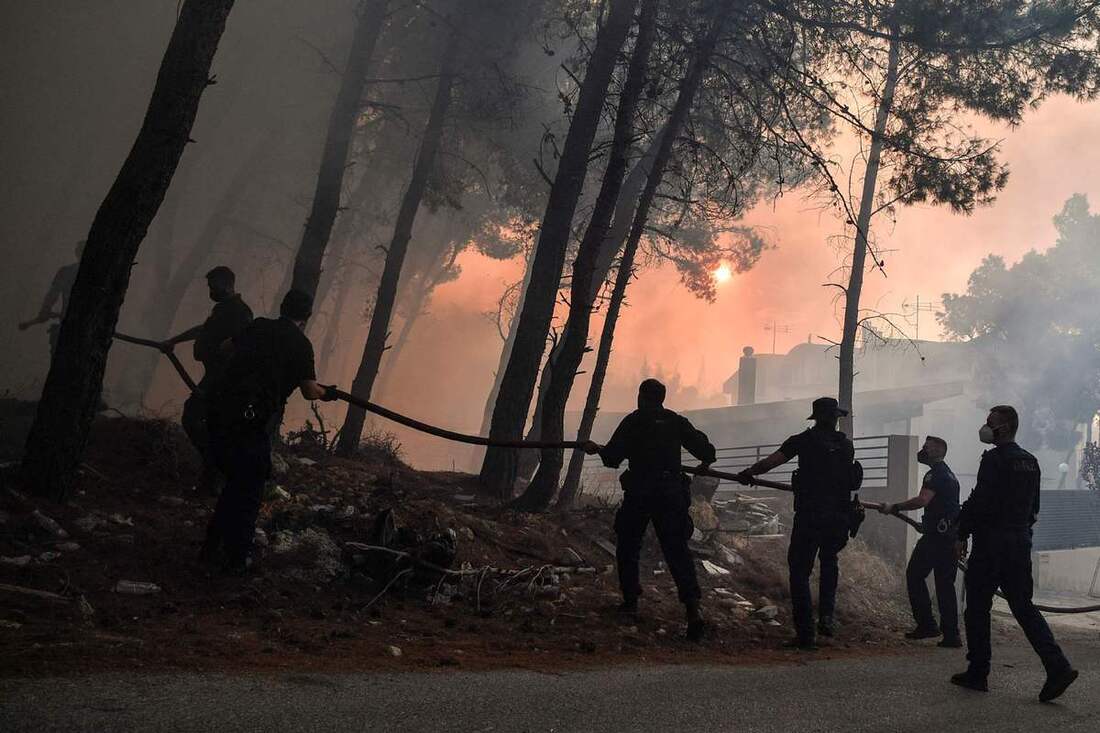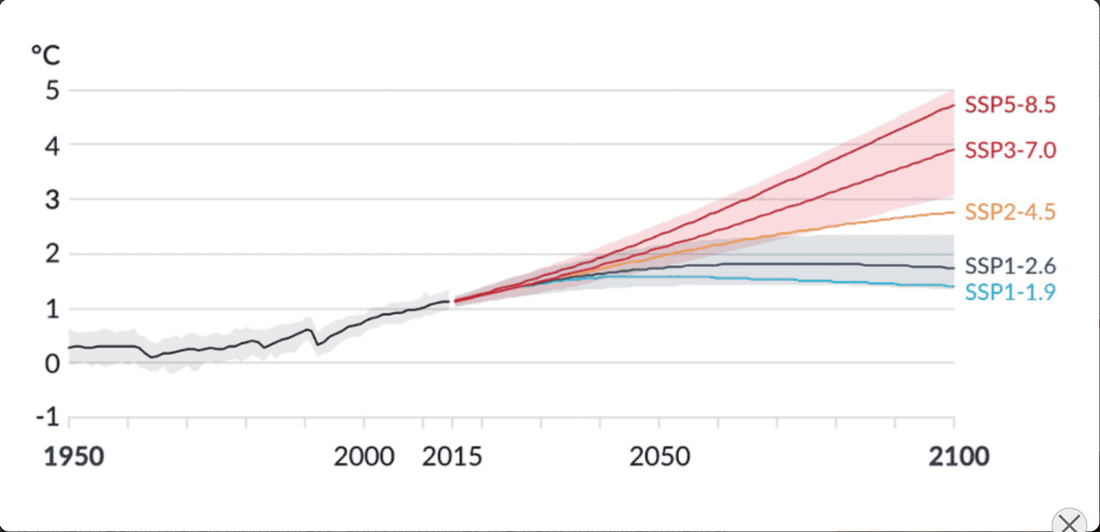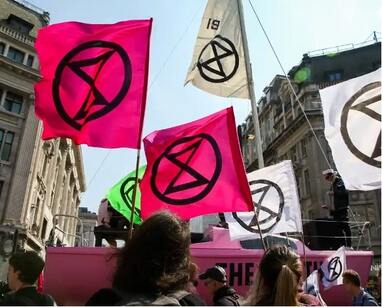|
Police officers help firefighters to extinguish a fire in Thrakomakedones, near Mount Parnitha, north of Athens A comment on the first part of the “Ecological Catastrophe, Collapse, Democracy and Socialism” debate The following commentary was written by Marxist thinker and author of Marx’s Ecology John Bellamy Foster on the first part of the debate “Ecological Catastrophe, Collapse, Democracy and Socialism” between the renowned American intellectual Noam Chomsky, the Chilean exponent of the new ideology of Collapsist Marxism Miguel Fuentes and climate scientist Guy McPherson. (The debate “Ecological Catastrophe, Collapse, Democracy and Socialism” can be read at the website of Marxism and Collapse.) One of the main achievements of John Bellamy Foster’s critical commentary is explaining his position on this debate by developing his own ideas in relation to what for him would constitute the most urgent task of the moment: to respond to the ecological catastrophe and the danger of an imminent civilisational collapse from an ecosocialist perspective. I accept much of what Noam Chomsky, Miguel Fuentes, and Guy McPherson say, but do not agree completely with any of them. My view of the planetary ecological emergency starts with the world scientific consensus, insofar as that can be ascertained, and draws on the long critique of capitalism developed most centrally by historical materialism. In terms of the scientific consensus on climate change, the reports of the United Nations Intergovernmental Panel on Climate Change (IPCC) are most important. The planetary emergency is not, however, confined to climate change, and also encompasses the entire set of planetary boundaries that are now being crossed, demarcating the earth as a safe home for humanity. Most of my comments here, though, will center on climate change. In terms of the IPCC’s Sixth Assessment Report, published over the course of 2021-2022, it is no longer possible for the world entirely to avoid crossing the 1.5° C increase in global average temperature. Rather, in the most optimistic IPCC scenario (SSP1-1.9) the 1.5° C mark will not be reached until 2040, global average temperatures will go up a further tenth of a degree by mid-century, and the increase in global average temperature will fall again to 1.4°C by the end of the century. We therefore have a very small window in which to act. Basically, meeting this scenario means peaking global carbon emissions by 2030 and reaching net zero carbon emissions by 2050. All of this was outlined in the first part of AR6 on the Physical Science Basis published in August 2021. This was followed by the publication of the IPCC’s Impacts, Adaptation and Vulnerability report in February 2022, and its Mitigation report in April 2022. Global surface temperature changes relative to 1850-1900 (IPCC, 2021) Each IPCC assessment report (AR1-AR6) has three parts, each of which is published separately and is introduced by a “Summary for Policymakers,” followed by a series of chapters. In the IPCC process scientists, reflecting the scientific consensus, write the whole draft report. But the “Summary for Policymakers” for each published part—the only section of the overall report that is widely read, covered by the press, and constitutes the basis for governmental policies—is rewritten line by line by governments. Hence the published “Summary for Policymakers” is not the actual scientific consensus document, but rather the governmental consensus document that displaces the former. Especially with respect to issues of mitigation, related to social policy, governments can obliterate the entirety of what the scientists determined. Capitalist world governments were particularly worried about, part 3 of AR6 on Mitigation, as drafted by scientists as of August 2021, since it was by far the most radical IPCC treatment of the mitigation issue, reflecting the fact that revolutionary-scale transformations of production, consumption, and energy use (both in terms of physical and temporal scales) were now needed if the 1.5°C pathway was to be reached—or even in order to keep the increase in global average temperature well below 2°C. This is considered the guardrail for avoiding irreversible out-of-control climate change, which, if crossed, would likely lead to a global average temperature of 4.4°C (best estimate) by the end of the century, leading to the collapse of global industrial civilization. Chapter I of the AR6 Mitigation report went so far as to question whether capitalism was sustainable. Anticipating that governments were prepared drastically to alter the scientific consensus “Summary for Policymakers”, scientists associated with Scientific Rebellion (linked to Extinction Rebellion) leaked the scientific consensus report for part 3 on Mitigation in August 2021, days before the release of part 1 of the report on The Physical Science Basis. This action allowed us to see the radical social conclusions of the scientists in Working Group 3, who well understood the enormous social transformations that needed to take place to stay within the 1.5°C pathway, and the inability of existing and prospective technologies to solve the problem, independently of transformative social change. The scientific consensus Summary for Policymakers for part 3 on Mitigation also pointed to the importance of vast movements from the bottom of society—involving youth, workers, women, the precarious, the racially oppressed, and those in the Global South, who had relatively little responsibility for the problem but were likely to suffer the most. All of this was eradicated, and in many cases inverted, in the published governmental consensus “Summary for Policymakers” in part 3 of AR6 on Mitigation, which was almost a complete inversion of what the scientists had determined. For example, the scientific consensus draft said that coal-fired plants had to be eliminated this decade, while the published governmental consensus report changed this to the possibility of increasing coal-fired plants with advancements in carbon capture and sequestration. The scientific consensus Summary for Policymakers attacked the “vested interests.” The published version removed any reference to the vested interests. More importantly, the scientific consensus report argued that the 1.5°C pathway could be reached while dramatically improving the conditions of all of humanity by pursuing low-energy solutions, requiring social transformations. This, however, was removed from the published governmental consensus Summary for Policymakers.
The world scientific consensus itself in this planetary emergency is being sacrificed to what ecologist Rachel Carson called “the gods of production and profit.” The only answer, as in the past, is a social earthquake from below coupled with volcanic eruptions in every locale forming a revolt of the world’s population, emerging as a new, all-encompassing environmental proletariat. There are incredible obstacles before us, not least of all the attempts of existing states to mobilize the right-wing elements of the lower-middle class, what C. Wright Mills called “the rear guard of the capitalist system,” generating a neo-fascist politics. Nevertheless, we are facing a historically unprecedented situation. A Global Ecological Revolt is already in the making. Hundreds of millions, even billions, of people will enter actively into the environmental struggle in our time. Whether it will be enough to save the earth as a home for humanity is impossible to tell. But the struggle is already beginning. It is possible for humanity to win, and our choice as individuals is how we join the struggle. It is clear from the world scientific consensus as embodied in the Mitigation report that a strategy of capitalist ecological modernization, financed by global carbon taxes and the financialization of nature, is something that is too little and too late—and relies on the juggernaut of capital that is already destroying the earth as a home for humanity—on the pretense that saving the climate can all be made compatible with the accumulation of capital. What Robert Pollin and Noam Chomsky have advanced in terms of green taxes and a global Green New Deal that depends primarily on decoupling economic growth from greenhouse gas emissions through technological change—basically a strategy of capitalist ecological modernization with some just transition features, is not sufficient to deal with the crisis at this point—and would at best give us a little more time. Even this, though, is being resisted by the vested interests as a threat to the system. The capitalist class at the top is so intertwined with fossil capital as to be incapable of even a meaningful strategy of climate reform. It is prepared to drag its feet, while building fortresses to safeguard its own opulent conditions, stepping up its looting of the planet. This is not quite a suicidal strategy from the standpoint of the self-styled “masters of the universe”, because they have already largely separated themselves in their consciousness from humanity, the earth, and the future. In contrast to Chomsky, Fuentes and McPherson, though realistic on many points, seem, in different ways, to have given up. Yet, humanity as a whole has not yet nor will it ever give up. As Karl Marx said quite realistically, in confronting the destruction that British colonial rule unleashed on the Irish environment and population in his day, it is a question of “ruin or revolution.” We know now that even in the most optimistic scenario whole constellations of ecological catastrophes are now upon us in the next few decades. This means that human communities and populations need to organize in the present at the grassroots for survival at the local, regional, national, and global levels. Issues of survival are bearing down the most on marginalized, precarious, oppressed, and exploited populations, although ultimately threatening the entire chain of human generations. It is here we must take our stand. As the great Irish revolutionary James Connolly wrote in his song “Be Moderate,” “We only want THE EARTH.” —John Bellamy Foster, June 10, 2022 AuthorJohn Bellamy Foster, professor of sociology at the University of Oregon, is editor of Monthly Review, an independent socialist magazine published monthly in New York City. His research is devoted to critical inquiries into theory and history, focusing primarily on the economic, political and ecological contradictions of capitalism, but also encompassing the wider realm of social theory as a whole. He has published numerous articles and books focusing on the political economy of capitalism and the economic crisis, ecology and the ecological crisis, and Marxist theory: (with Brett Clark) The Robbery of Nature: Capitalism and the Ecological Rift; The Return of Nature: Socialism and Ecology; (with Paul Burkett) Marx and the Earth: An Anti-Critique (2016); The Theory of Monopoly Capitalism: An Elaboration of Marxian Political Economy (New Edition, 2014); (with Robert W. McChesney) The Endless Crisis: How Monopoly-Finance Capital Produces Stagnation and Upheaval from the USA to China (2012); (with Fred Magdoff) What Every Environmentalist Needs to Know About Capitalism: A Citizen's Guide to Capitalism and the Environment (2011); (with Brett Clark and Richard York) The Ecological Rift: Capitalism’s War on the Earth (2009); (with Fred Magdoff) The Great Financial Crisis: Causes and Consequences (2009); The Ecological Revolution: Making Peace with the Planet (2009); (with Brett Clark and Richard York) Critique of Intelligent Design: Materialism versus Creationism from Antiquity to the Present (2008); Ecology Against Capitalism (2002); Marx's Ecology: Materialism and Nature (2000); (with Frederick H. Buttel and Fred Magdoff) Hungry for Profit: The Agribusiness Threat to Farmers, Food, and the Environment (2000); The Vulnerable Planet: A Short Economic History of the Environment (1999); (with Ellen Meiksins Wood and Robert W. McChesney) Capitalism and the Information Age: The Political Economy of the Global Communication Revolution (1998); (with Ellen Meiksins Wood) In Defense of History: Marxism and the Postmodern Agenda (1997); The Theory of Monopoly Capitalism: An Elaboration of Marxian Political Economy (1986); (with Henryk Szlajfer) The Faltering Economy: The Problem of Accumulation Under Monopoly Capitalism (1984). His work is published in at least twenty-five languages. Visit johnbellamyfoster.org for a collection of most of Foster's works currently available online. This article was republished from Monthly Review. Archives July 2022
0 Comments
Leave a Reply. |
Details
Archives
July 2024
Categories
All
|



 RSS Feed
RSS Feed